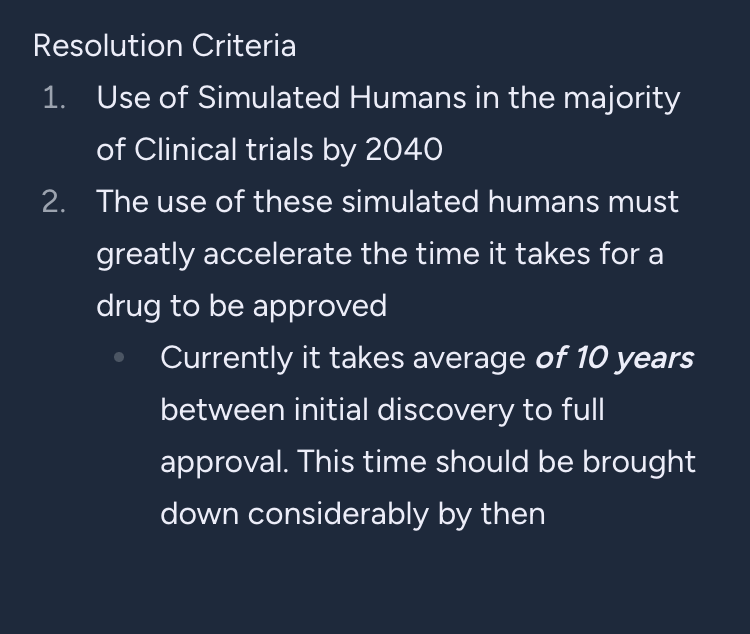Ray Kurzweil recently predicted that we will use simulated humans to accelerate clinical trials and cure all major diseases by 2029 (full quote below)
by using simulated humans Kurzweil believes we can greatly speed up both drug development & approvals
I've modified his prediction by extending it to 2040 as a margin of error & excluded his mention of curing all major diseases.
Resolution Criteria
Use of Simulated Humans in the majority of Clinical trials by 2040
The use of these simulated humans must greatly accelerate the time it takes for a drug to be approved
Currently it takes average of 10 years between initial discovery to full approval. This time should be brought down considerably by then
Full Quote from Kurzweil:
I’ll add one more AI topic, and I’m sure we’ll get into a lot more during the questions and answers. But something else that’s also extremely exciting, which is simulated biology.
This has already started. The Moderna vaccine was created by feeding in every possible combination of mRNA sequences and simulating in the computer what would happen.
They tried several billion of such sequences, and they went through them all and seen what the impact would be. It took two days to process all several billion of them. And then they had the vaccine. It actually took two days to create.
It’s been the most successful COVID vaccine. And because we did test it with humans, we’re going to get over that as well.
We’re ultimately going to be using biological simulation of humans to replace human testing. I mean, rather than spending a year or several years testing the results on a few hundred subjects, none of which probably match you, we will test it on a million or more simulated humans in just a few days.
So to cure cancer, for example, we’ll simply feed in every possible method that can detect cancer cells from normal cells and destroy them or do anything that would help us.
And we won’t evaluate them. We’ll just feed in all the ideas we have about each of these possibilities into the computer.
The computer will evaluate all of the many billions of sequences and provide the results. We’ll then test the final product with simulated humans, also very quickly.
And we’ll do this for every major health predicament. It will be done a thousand times faster than conventional methods.
And based on our ability to do this, we should be able to overcome most significant health problems by 2029.
That’s, by the way, my prediction for passing the Turing test. I came out with that in 1999. People thought that was crazy.
I think the wording of this quote is pretty vague. This question will likely resolve yes because we will end up in a world where the criteria is met, but the actual implementation may be quite different to what kurzweil (or the reader) has in mind
@MalachiteEagle oops, I misread what you said
Yep, it’ll be interesting to see how much we can compress the representation of a simulated human while still being able to gain useful insights from them for clinical trials.
I think it may not actually be that compressed, partially because we’ll have more than enough compute, but also because our bodies are complex systems and we see empirically that there’s a long tail of n=1 people that have all kinds of bizarre side effects we don’t see during even the largest clinical trials which implies that minor variations in biology can make a big difference. Seems to suggest not much room for compression
